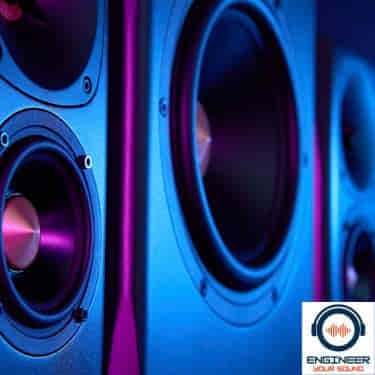As an avid music enthusiast, I’ve often thought about speaker size and wondered if bigger speakers equate to louder, better, and more efficient sound.
Throughout the years, I’ve had the pleasure (and sometimes, the displeasure) of experimenting with many speakers, each differing in size, brand, and technology.
Bigger speakers generally produce louder sounds due to their larger cones and greater power-handling capabilities. However, other factors like efficiency and design also play a role in determining the loudness of a speaker.
Bigger speakers can produce more sound pressure and have extended low-frequency response, resulting in better overall sound quality. However, smaller speakers can also sound good or even better in certain situations. Bigger speakers do not necessarily mean better sound.
In this article, I will delve into this question, exploring the influence of speaker size on sound, bass, overall quality, and efficiency.

Are Bigger Speakers Louder? (And do they sound better?)
The size of a speaker will have an impact on its loudness. Larger speakers generally have larger cones that can pump out more volume. These larger cones generally sound louder simply because a larger cone can move more air, which is how sound is transmitted. As a result, bigger speakers are perceived as louder. However, it’s more complex than ‘bigger equals louder’.
The loudness of a speaker is also determined by other factors, such as its efficiency, the power of the amplifier that’s driving it, and the environment in which it’s being used.
As for whether bigger speakers sound better, this is a highly subjective matter and depends largely on what you’re looking for in sound quality.
From my experience, larger speakers can often deliver fuller, richer bass because they have larger woofers that can move the large volumes of air needed for low frequencies. However, the quality of the sound will depend greatly on the quality of the speaker’s components and design.
You can get a great and full audio spectrum listening experience with a well-designed large speaker.
Even so, larger speakers may not always be suitable for certain types of music or certain listening environments. Therefore, in the quest for the perfect sound, it’s essential to consider not just the size of the speaker but also the type of music you typically listen to, the acoustics of your room, and your preferences.
How Does Speaker Size Affect Sound?
The size of a speaker significantly influences its sound output, predominantly due to two main factors: the driver’s size and the speaker enclosure’s resonance.
Larger speaker drivers can move more air, thus creating sound waves with greater amplitude, leading to louder sounds and greater bass extension.
On the other hand, smaller drivers are better at reproducing higher-frequency sounds.
Additionally, a larger speaker enclosure can resonate more profoundly, enhancing the richness and fullness of the sound, especially in the lower frequency ranges.
However, it’s important to note that a speaker’s design, material quality, and the amplifier’s power are equally crucial to shaping the sound’s overall quality – not just speaker size.
Do Bigger Speakers Have More Bass?
Regarding bass, bigger speakers are typically designed with larger woofers, which are the drivers responsible for producing low-frequency sounds.
These larger woofers can move more air, thus generating more powerful bass frequencies. Smaller speakers may struggle to achieve the same bass level due to their limited ability to move as much air.
However, purely having a bigger speaker doesn’t guarantee better bass. Factors such as the quality of the woofer, the design of the speaker enclosure, and the overall tuning of the speaker system also play decisive roles.
Therefore, while it’s generally true that bigger speakers can produce more bass, the bass’s quality, depth, and richness are determined by more than just size.
Do Bigger Speakers Sound Better?
Whether bigger speakers sound better is not one with a simple yes or no answer. The sound quality produced by speakers is determined by various elements, including their design, construction materials, the quality of their drivers, and how they are set up in the room they are in.
Bigger speakers have the advantage of larger drivers and more space for sound to resonate, leading to a fuller, richer listening experience. They might be more capable of delivering a wide range of frequencies, from deep, room-rumbling bass to clear, detailed highs. However, all of this is pointless without a quality design and build.
A small, well-designed, high-quality speaker often outperforms a larger, poorly-made one.
Furthermore, bigger speakers might not always be the best choice for smaller rooms, where their powerful output could lead to sound distortion. So, while size can play a role in sound quality, it is not the only factor to consider.
Are Bigger Speakers More Efficient?
In the context of speakers, efficiency refers to the ability of a speaker to convert the electrical power it receives into sound. When superficially evaluated, one might assume that bigger speakers would be more efficient with their larger components. However, the truth is a little more complex.
Bigger speakers can produce more volume for a given amount of electrical power, thus making them seem more efficient in a certain sense. Nevertheless, they also tend to require more power to drive effectively, especially for bass frequencies, due to their larger cones and heavier coils.
Thus, while they might give more volume per watt, their overall power demands may be higher.
Additionally, a speaker’s efficiency is significantly influenced by its design and the quality of its components.
Therefore, while speaker size can influence efficiency, it is not the sole determining factor. A well-designed, high-quality speaker will often outperform a less meticulously crafted counterpart, regardless of size.
Final Thoughts
A speaker’s size can influence various aspects of its performance, including loudness, bass production, overall sound quality, and efficiency.
Due to their bigger cones and woofers, larger speakers can typically produce louder sounds and more powerful bass. They can also provide a richer sound due to larger drivers and more room for sound to resonate.
However, size’s impact on sound quality and efficiency is deeply intertwined with other elements such as design, construction materials, and the quality of the drivers.
Therefore, while size is a critical factor when choosing a speaker, it should not be the only determinant. You should also pay attention to the quality and design of the speaker, your listening environment, and your personal preferences.
After all, the ultimate goal is to find a speaker that delivers a satisfying sound experience, and achieving this may require balancing various factors, not just size.
